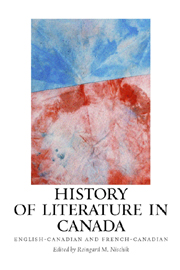Book contents
- Frontmatter
- Contents
- Acknowledgments
- Introduction: Writing a History of Literature in Canada
- I Beginnings
- II The Literature of New France, 1604–1760
- III The Literature of British Canada, 1763–1867
- IV From the Dominion to the Territorial Completion of the Nation, 1867–1918
- V The Modern Period, 1918–1967
- 11 Politics and Literature between Nationalism and Internationalism
- 12 English-Canadian Poetry, 1920–1960
- 13 The English-Canadian Novel and the Displacement of the Romance
- 14 The Modernist English-Canadian Short Story
- 15 Early English-Canadian Theater and Drama, 1918–1967
- 16 French Canada from the First World War to 1967: Historical Overview
- 17 French-Canadian Poetry up to the 1960s
- 18 The French-Canadian Novel between Tradition and Modernism
- 19 The French-Canadian Short Story
- 20 French-Canadian Drama from the 1930s to the Révolution tranquille
- VI Literature from 1967 to the Present
- Further Reading
- Notes on the Contributors
- Index
18 - The French-Canadian Novel between Tradition and Modernism
from V - The Modern Period, 1918–1967
Published online by Cambridge University Press: 12 September 2012
- Frontmatter
- Contents
- Acknowledgments
- Introduction: Writing a History of Literature in Canada
- I Beginnings
- II The Literature of New France, 1604–1760
- III The Literature of British Canada, 1763–1867
- IV From the Dominion to the Territorial Completion of the Nation, 1867–1918
- V The Modern Period, 1918–1967
- 11 Politics and Literature between Nationalism and Internationalism
- 12 English-Canadian Poetry, 1920–1960
- 13 The English-Canadian Novel and the Displacement of the Romance
- 14 The Modernist English-Canadian Short Story
- 15 Early English-Canadian Theater and Drama, 1918–1967
- 16 French Canada from the First World War to 1967: Historical Overview
- 17 French-Canadian Poetry up to the 1960s
- 18 The French-Canadian Novel between Tradition and Modernism
- 19 The French-Canadian Short Story
- 20 French-Canadian Drama from the 1930s to the Révolution tranquille
- VI Literature from 1967 to the Present
- Further Reading
- Notes on the Contributors
- Index
Summary
The Rise and Demise of the Farm Novel
AS IN THE PRECEDING DECADES, the development of the French-Canadian novel after 1918 was closely connected to the nationalism of Quebec's Catholic intelligentsia: In 1866 Abbé Henri-Raymond Casgrain demanded that the novel should advocate the French language and Catholicism, as well as concentrate on regional themes, country life, and the memory of Nouvelle-France. Camille Roy's speech “La nationalisation de la littérature canadienne,” held in 1904 in the Société du parler français, built upon Casgrain's theses and led the way for virtually all novels produced until 1930. In order to adequately perform its function as a Canadian “épopée chevaleresque” and as a “gardienne toujours fidèle des intérêts supérieurs de la race et de la nationalité,” French-Canadian literature should above all be inspired by an authentic Christian faith, as well as comply with the creed: “Faisons ici une littérature qui soit à nous et pour nous.”
Roy's demands were echoed by the nationalistic writings of historian Lionel Groulx (1878–1967), who in La naissance d'une race (1919) advocated the purity of the French-Canadian race and even spoke of a “race supérieure.” Groulx established a concept of Nouvelle-France as a “terre d'élection,” not unlike the American concept of the “city upon a hill.” Similar to Roy, Groulx saw the regionalist-agriculturalist literature as the only authentic expression of the French-Canadian national character.
- Type
- Chapter
- Information
- History of Literature in CanadaEnglish-Canadian and French-Canadian, pp. 242 - 263Publisher: Boydell & BrewerPrint publication year: 2008

